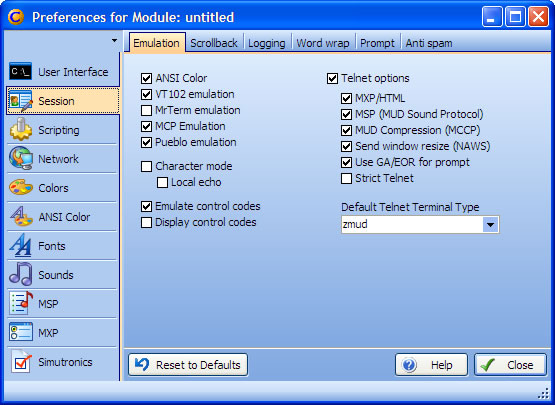|
|
 |
|
|

- ANSI Color
- If enabled, ANSI color control codes are recognized in the MUD output window. If disabled, ANSI color codes are not parsed and are displayed verbatim. Default is enabled.
- VT102 emulation
- If enabled, VT102 control codes are recognized in the MUD output window. If disabled, VT102 control codes are not parsed and are displayed verbatim. Default is enabled.
- MrTerm emulation
- If enabled, special control sequences defined by the MrTerm protocol are recognized for setting color values. If disabled, MrTerm control codes are not parsed. Default is disabled.
- MCP Emulation
- If enabled, the MUD Client Protocol (MCP) is enabled and MCP commands are recognized. If disabled, MCP commands are not parsed. Default is enabled.
- Pueblo Emulation
- If enabled, a subset of Pueblo HTML tags are recognized and parsed. If disabled, Pueblo tags are not parsed. Default is enabled.
- Character mode
- If enabled, the user can click on the MUD output window and can enter text directly into the window instead of using the command line. When entering text directly into the MUD window, each character is sent to the MUD immediately, and Ctrl-key codes are also recognized. If disabled, then only the command line can be used to send commands to the MUD a line at a time. Default is disabled.
- Local echo
- When Character mode is enabled, this option determines whether characters are echoed to the output window as soon as they are typed. If disabled, then the characters are sent to the MUD and are not displayed in the output window unless the MUD sends the character back to the client (server or remote echo). Default is disabled.
- Emulate control codes
- If enabled, all control codes are parsed as needed by various other emulation protocols. If disabled, all control codes from the MUD are ignored. Default is enabled.
- Display control codes
- When Emulate control codes is disabled, this option can be used to display the control codes to the screen in a human readable manner. Typically used to debug MUD output to see exactly what control codes are being sent by the MUD. Default is disabled.
- Telnet Options
- If enabled, the Telnet Option negotiation protocol is activated, allowing the MUD to query various features of CMUD. The options listed below can be used to turn off or on specific telnet options. If disabled, no telnet option negotiation is performed. Some old MUDs do not properly support telnet option negotiation and might require this option to be disabled. Default is enabled.
- MXP/HTML
- Enable or disable telnet option 91 for the MXP protocol. Default is enabled.
- MSP (MUD Sound Protocol)
- Enable or disable telnet option 90 for the MSP protocol. Default is enabled.
- MUD Compression (MCCP)
- Enable or disable telnet options 85 and 86 for the MCCP protocol. Default is enabled.
- Send window resize (NAWS)
- Enable or disable telnet option 31 for the NAWS protocol. Default is enabled.
- Use GA/EOR for prompt
- Enable or disable telnet option 25 for the EOR protocol. If enabled, GA/EOR characters are used to indicate the end of lines. Text received after a GA/EOR sequence will start on a new line. Default is enabled.
- Strict Telnet
- If enabled, very strict telnet protocol emulation is enabled. Many MUDs do not follow strict telnet protocol, especially in the implementation of telnet option negotiation. If disabled, CMUD tries to figure out what the MUD is trying to do even when it sends improper telnet option codes. This provides compatible for older MUDs. Default is disabled.
- Default Telnet Terminal Type
- Sets the string value returned from telnet option 24 (TERMTYPE). Can be any text value. Default is "cmud".
|
|
